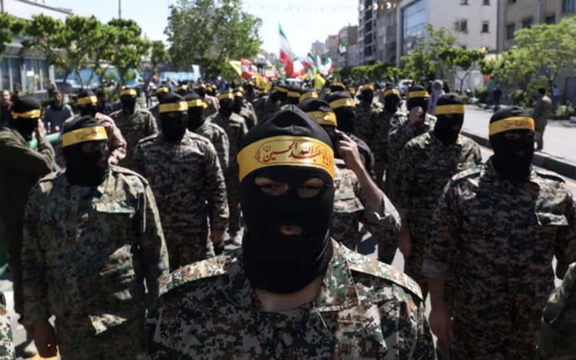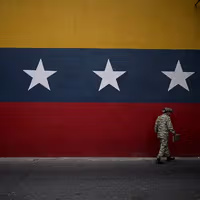Iran Holds Funeral For IRGC Officers Killed In Damascus Consulate Strike
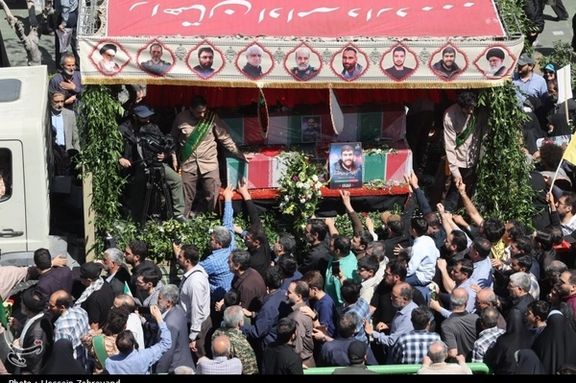
Iran held a funeral on Friday for seven Revolutionary Guards killed in an Israeli airstrike on the Iranian consulate in Syria earlier this week.

Iran held a funeral on Friday for seven Revolutionary Guards killed in an Israeli airstrike on the Iranian consulate in Syria earlier this week.
State broadcaster showed demonstrators carrying pictures of those killed and banners with slogans such as "Death to Israel" and "Death to America".
The funeral coincided with the annual Quds (Jerusalem) Day, during which Iran stages large state-sponsored pro-Palestinian and anti-Israel rallies nationwide.
Among those killed in Monday's airstrike on the Iranian embassy compound in the Syrian capital Damascus was one of Iran's top soldiers, Brigadier General Mohammad Reza Zahedi, a senior commander in the Revolutionary Guard’s Quds Force, the extraterritorial wing of the IRGC.
It was the boldest, and deadliest, in a series of attacks that have killed Iranian officials in Syria since December. According to The Financial Times, suspected Israeli strikes have claimed the lives of 18 IRGC commanders and advisers since the Gaza war broke out on October 7.
Iran vowed harsh retaliation, raising the specter of a wider war and prompting the Israeli armed forces to suspend leave for all combat units on Thursday, a day after they said they were mobilizing more troops for air defense units.
Israeli Prime Minister Benjamin Netanyahu said on Thursday his country would harm "whoever harms us or plans to harm us".
The coffins of two of the killed officers were displayed in the capital, Tehran, to religious mourning chants. Some of those present waved the Palestinian flag. All seven officers were expected to be buried later on Friday.
Iran's Jerusalem Day rallies are held annually on the last Friday of the Muslim fasting month of Ramadan in support of Palestinians, who want East Jerusalem as the capital of a future state in territories captured by Israel in a 1967 war.
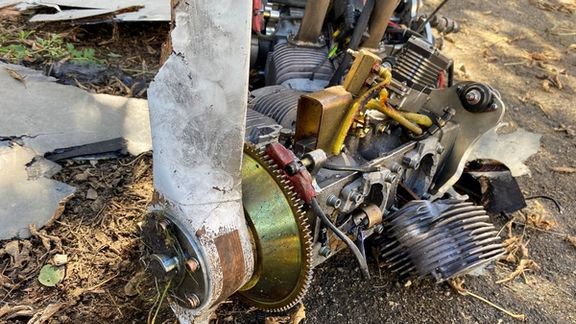
Border police in ex-Soviet Moldova said on Thursday they had found and cordoned off what appeared to be fragments of an Iranian-made Russian drone just inside the country's border with Ukraine.
A police statement said the fragments were found near the villages of Etulia and Vladiceni and bore the inscription Heran-2, another name for Iranian-made Shahed kamikaze drones used by Russia in its conflict with Ukraine.
Iran began supplying the drones to Russia in mid-2022. Hundreds have so far been used against Ukraine’s infrastructure and during massive missile attacks in order to swamp air defenses. European powers and the United States have warned Iran against arming Russia amid fears that Tehran might supply ballistic missiles.
The fragments were found in an area about 500 meters (1,600 feet) from the border with Ukraine, with access to the area restricted, the police said. There were no dangerous elements in the fragments and no danger to the area's residents.
There have been several instances of fragments of Russian drones and missiles found on the territory of Moldova, which lies between Ukraine and Romania. Drone fragments were found near the same villages in February.
Pro-European President Maia Sandu has denounced Russia's invasion of its neighbor and singles out Moscow and corruption as the two biggest threats to her country's sovereignty.
Sandu has set a drive to join the European Union as her main policy goal.

World markets faced turbulence on Friday as tensions rose between Iran and Israel following a strike earlier in the week that killed seven IRGC personnel in the Iranian embassy in Syria.
Iran has vowed retaliation against Israel, creating more tensions in a region already experiencing six months of war in Gaza and a ‘sitting war’ between Israel and Iran’s chief proxy, the Lebanese Hezbollah. Prime Minister Benjamin Netanyahu said Thursday his country would harm "whoever harms us or plans to harm us".
Shares retreated late on Thursday and in early trading on Friday amid warnings of a possible retaliatory attack by Iran and further military response by Israel. Oil prices also remained high, as the threat of supply disruptions in case of a prolonged conflict in the Middle East kept Brent futures above $90 a barrel, a level not seen since last October.
US futures were all lower partly reacting to Middle East tensions and also ahead of US job data to be announced on Friday.
Rodrigo Cartil, a forex strategist at National Australia Bank told Reuters, "There is a little bit of edginess in the air not helped by a spike in oil prices amid an increase in Israel-Iran tensions.” He added that, "The risk of escalation in the Middle East conflict is rising."
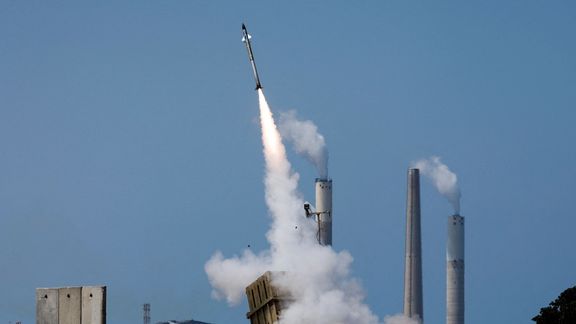
Concerns regarding a potential Iranian attack on Israel reached their peak on Thursday, the eve of the last Friday of Ramadan, which Tehran has designated as Quds Day in solidarity with Palestinians.
Late Thursday, Axios reported that Israel has gathered intelligence that shows Iran could attack Israel from its soil using long-range ballistic missiles, cruise missiles or drones”. Axios also cited an Israeli source about a phone call between Israeli and American defense ministers.
In his cabinet meeting Thursday, Netanyahu warned Iran that Israel would “harm” anyone who wants to harm it. "For years, Iran has been acting against us both directly and via its proxies,” he said, “Israel is acting against Iran and its proxies, defensively and offensively."
The term ‘Quds Day’ was first coined in Iran immediately after the 1979 Revolution. It gained significance after Ruhollah Khomeini, the leader of that revolution –and the founder of Iran’s Islamic Republic– called on Muslims everywhere to mark the day by pro-Palestinian rallies and protests against Israel.
Quds Day and the fasting month of Ramadan has often seen a heightened tension in Israel and the Palestinian Occupied Territories, but this year the stakes are much higher because of October 7th and the ensuing Israeli onslaught on Gaza, which has drawn the world’s attention to the decades-long tragedy like never before.
“This year’s Quds Day will be a global uproar against the usurping Zionist regime,” Iran’s leader Ali Khamenei said this week. “In previous years, Quds Day [rallies] were held only in Islamic countries. But this year, it’s highly likely that Quds Day [rallies] are organized in non-Islamic countries as well, with glory, God willing.”
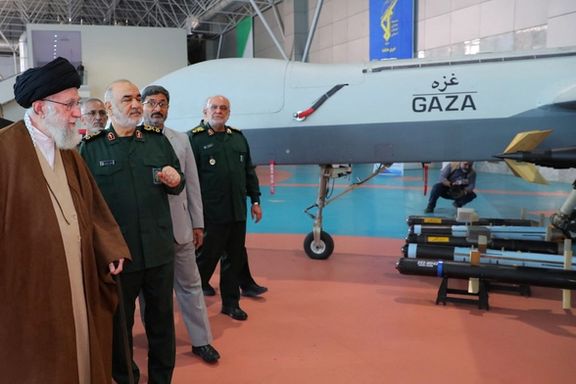
Israeli officials had raised concerns about potential attacks by Iran, Hamas, and Hezbollah before Ramadan began. Defense minister Yoav Gallant had predicted attempts to turn the holy Muslim month into the “second phase” of what happened on October 7th and "inflame the region."
Four days to the end of Ramadan, the “second phase” Gallant warned about seems to have not materialized. But the fear of a Middle East in “flames” is still very much alive, even more so since April 1 when Israel killed seven members of Iran’s Revolutionary Guards, including two high-ranking commanders, in an unprecedented airstrike on Iran’s consulate in Damascus.
Most Iranian officials immediately threatened to retaliate. There were also some inside Iran who called for a “measured response” to avoid escalation. Khamenei spoke of “punishment” for Israel. “We will make them regret this crime and other ones like it,” he said one day after the airstrike on Iran’s consulate.
Shortly after, reports began circulating in Israeli media about the possibility of retaliatory attack by Iran or its proxies, raising fears among the public and putting the Israeli army on high alert.
US officials said they had not picked up intelligence suggesting Iran-backed groups were looking to target US troops following Monday's attack.
Nonetheless some experts and insiders –such as Amos Yadlin, a former Israeli intelligence chief– warned that Iran might choose Quds Day (Friday 5 April) to respond to the strike on its consulate in Syria, either directly or through a proxy.
Until now, Iran has somehow avoided direct confrontations with Israel and the US. But on Thursday, Reuters quoted a US official, speaking on condition of anonymity, that many fear “Iran would make good on its threats to retaliate, raising the risk of volatile, regional escalation.”
But many experts believe that Tehran is not as interested, as it shows it is, in a full-blown war with Israel –and potentially the US– not least because a costly war could further destabilize the country and mark the beginning of the end of the Islamic Republic.
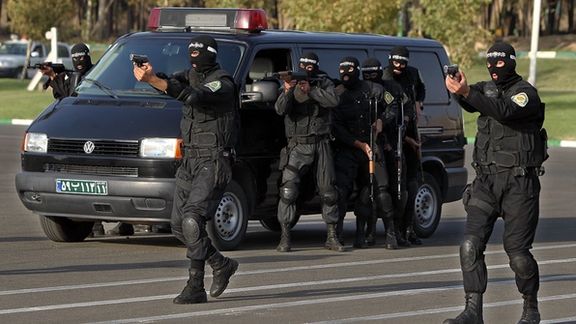
In the wake of a spate of deadly militant attacks in southeastern Iran, criticism of the government's intelligence and security failures has intensified, labeling it a "paper tiger."
Iran International has been flooded with messages from viewers critical of the Iranian government. These messages highlight a perceived discrepancy between the government's harsh treatment of its own citizens and its apparent inefficacy in dealing with external threats.
In a late-night attack on Wednesday, the Sunni militant group Jaish ul-Adl targeted at least five military posts and Revolutionary Guard bases in the cities of Chabahar and Rask. Clashes continued throughout the night, with the government announcing the neutralization of all attackers by Friday noon. At least 28 individuals were killed in the clashes, including 18 militants and 10 Iranian military personnel. Full casualty figures for the injured are unavailable, but reports indicate at least 15 Guards were wounded from a single unit. Jaish ul-Adl has a well-documented history of targeting Iranian forces, particularly the Revolutionary Guards, in areas bordering Pakistan. Designated a foreign terrorist organization by the US in 2010, the group has also been implicated in civilian casualties from past bombings.
The attack comes just a few days after an Israeli airstrike on Iran's consulate in Damascus, Syria, which killed seven Revolutionary Guards, including a high-ranking general. Since the outbreak of the Gaza War in October, suspected Israeli strikes have eliminated at least 18 IRGC commanders and advisors. In response, Iran has issued repeated threats of "harsh revenge," with pronouncements from regime officials, including the Supreme Leader himself.
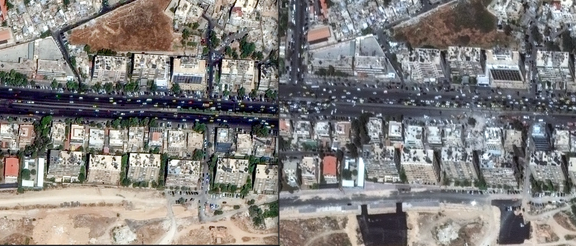
A recurring theme in the messages sent to Iran International was that the attacks in Sistan-Baluchestan and Syria prove that the Islamic Republic is unable to respond to or prevent the attacks abroad and at home. “The Islamic Republic's real strength is in suppressing its own people," one of person said. “The government is able to quickly identify and punish any Iranian who expresses the slightest opposition to the regime.”
In response to the attacks in Syria and Sistan-Baluchistan Province, the Islamic Republic has resorted to threatening Israel with revenge. However, according to an audio file, this is merely a display of strength, as the Islamic Republic lacks the capability to defeat Israel.
Another Iranian highlighted that the Tehran's claims of its military power are a "sham" as it has not been able to defeat Jaish ul-Adl, a small guerrilla group that repeatedly carry out attacks in Iran. “They can't even handle Jaish ul-Adl, a guerrilla group, and yet they claim they can defeat Israel with all its equipment and intelligence superiority."
In January, IRGC targeted what it claimed were hideouts of the Sunni militants in Pakistan's Baluchistan with missiles. Islamabad retaliated with heavy fire a day later, marking the first attack by a foreign country inside Iranian soil since the end of the Iran-Iraq war (1980-1988). Iranians slammed the government for not responding to Pakistan’s airstrikes.
Frequent criticism of the Islamic Republic is that it maintains power solely through the repression of its own citizens. Its strength is only in "killing its own people," said an Iranian in an audio file sent to Iran International.
The Islamic Republic's intelligence capabilities are only good for "identifying opponents of compulsory hijab, harassing and imprisoning them, killing young protesters and silencing trade union activists."
All in all, these comments suggest a widespread skepticism about the Islamic Republic's claims about its military and intelligence capabilities. Instead, Iranians perceive the regime's true strength to lie in its ability to suppress dissent.

The United States announced new Iran-related counterterrorism sanctions on Thursday, targeting Oceanlink Maritime DMCC and its vessels.
The new sanctions are a response to Oceanlink Maritime DMCC's involvement in shipping commodities for Iran's military, the US Treasury Department said.
These sanctions aim to isolate Iran and hinder its ability to fund proxy groups through financial restrictions. The UAE-based Oceanlink manages a fleet of over a dozen vessels heavily involved in transporting Iranian goods, according to the Treasury Department.
“We are focused on disrupting Iran’s ability to finance its terrorist proxy and partner groups and support to Russia’s war of aggression against Ukraine,” said Under Secretary of the Treasury for Terrorism and Financial Intelligence Brian E. Nelson. “The United States will continue to use our full range of tools to target the illicit funding streams that enable Iran’s destabilizing activities in the region and around the world.”
Abram Paley, the US Deputy Iran Envoy said in a statement on X that “Financial supporters of Iran's Ministry of Defense will be subject to US sanctions for contributing to Iran's illicit funding streams. We remain committed to disrupting Iran’s support to terrorism throughout the Middle East and production of weapons that support Russia’s war of aggression against Ukraine.”
The US Treasury Department highlighted the recent activities of the Oceanlink-managed vessel HECATE, which conducted a ship-to-ship transfer loading Iranian commodities valued at over $100 million dollars from another sanctioned tanker.
In its statement, the Treasury underscored the series of US and Western sanctions aimed at curtailing Iran's destabilizing activities across the globe. Iran's network of proxies spans various countries in the Middle East, including Lebanon, Syria, Iraq, and Yemen.
